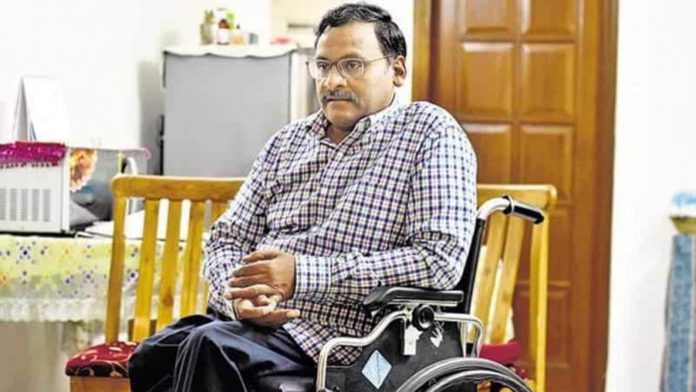G.N. Saibaba, a wheelchair-bound academic, is an active campaigner for the rights of oppressed communities, including Dalit and Indigenous communities. He was arrested in 2014 for allegedly having links with banned Maoist organizations. In March 2017, he was convicted and sentenced to life in prison.
Basil Islam | TwoCircles.net
NEW DELHI — In a joint statement, international human rights organizations have expressed concerns about the deteriorating health of former Delhi University professor and activist G.N. Saibaba, sentenced to life under the stringent Unlawful Activities Prevention Act (UAPA). They called on the Indian authorities to provide urgent access to health care and release him on humanitarian grounds.
G.N. Saibaba, a wheelchair-bound academic, is an active campaigner for the rights of traditionally oppressed communities, including Dalit and Indigenous communities. He has spoken out against the violence and discrimination faced by these communities, especially in mineral-rich central India. He got arrested in 2014 for allegedly having links with banned Maoist organizations. In March 2017, he was convicted and sentenced to life in prison. An appeal for suspending his sentence is pending in the Nagpur Bench of the Bombay High Court.
Saibaba is 90% physically disabled due to polio and other severe health issues, including a heart condition, a brain cyst, hypertension, and breathing difficulties. He is in solitary confinement in the anda cell of Nagpur Central Jail. Family members said that due to the extreme summer heat in cramped conditions, he had suffered a severe deterioration of his health, including rectal bleeding and breathing difficulties.
In 2018, the United Nations rights experts called for Saibaba’s release on medical grounds. The report reminded India that “any denial of reasonable accommodation for people with disabilities in detention is not only discriminatory but may well amount to ill-treatment or even torture.”
While in prison, his left arm got paralyzed due to nerve damage and the lack of timely treatment. Following the COVID-19 outbreak, he has twice contracted the virus, dangerously worsening his health. Many experts fear that continued denial of urgent health care to Saibaba might result in irreversible and possibly fatal damages.
Following are the demands made by the international human rights groups:
- Release G.N. Saibaba on humanitarian grounds for health reasons.
- Pending his release, provide G.N. Saibaba with immediate and ongoing access to adequate health care, move him out of solitary confinement and make reasonable accommodations for his disabilities.
- Ensure G N Saibaba is protected from torture and other ill-treatment while in detention and that he is allowed, without delay, regular access to his family and lawyer.
- For the National Human Rights Commission of India to act to ensure G.N Saibaba’s access to adequate treatment, in line with the appeals submitted by his family and civil society.
- Amend the Unlawful Activities (Prevention) Act, following a genuine and meaningful consultation with independent civil society organizations and human rights defenders, to bring it into line with India’s obligations under international human rights law.
- Ensure human rights defenders in India can carry out their human rights work without fear of reprisals, including through misuse of the criminal justice system.
The joint statement released on 22 June 2022 is signed by CIVICUS, Amnesty International, Asian Forum for Human Rights and Development, Front Line Defenders, Human Rights Watch, International Federation for Human Rights, and World Organisation Against Torture.
Basil Islam is an independent journalist and researcher based in South India. He tweets at @baasiie


